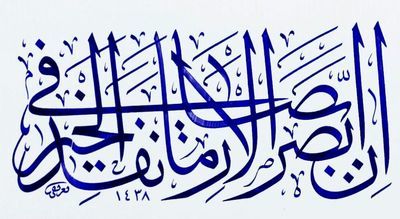Iran opposes Turkey’s bid to inscribe “Islamic calligraphy” on UNESCO list

TEHRAN.(Iranart) – Iran’s Ministry of Cultural Heritage, Tourism and Handicrafts (MCHTH) announced on Monday that it is opposed to Turkey’s proposal to register Islamic calligraphy as its own heritage on the UNESCO List of the Intangible Cultural Heritage of Humanity.
Iran has officially expressed its opposition to Turkey’s proposal to register a file named “Islamic calligraphy” during a UNESCO session in 2021, said deputy minister Mohammad-Hassan Talebian.
“Each country can make an attempt to inscribe its calligraphy on the list, but using the adjective ‘Islamic’ refers to a territory wider than Turkey and this is contrary to the 2003 Convention for the Safeguarding of the Intangible Cultural Heritage,” he stated.
“Turkey’s title for the file carries the word ‘Islamic’ and Iran has officially expressed its opposition to this title, because Islam is not limited to Turkey and moreover, the origins of Islamic calligraphy should be traced back to Iran,” he noted.
Earlier in June, Mostafa Purali, a senior official with the MCHTH announced that Iranian calligraphy is seeking to be registered on the UNESCO List of the Intangible Cultural Heritage of Humanity.
He said that UNESCO’s Intergovernmental Committee for the Safeguarding of the Intangible Cultural Heritage will announce its decision about the file during its session in 2022.
“The writing system in use in Persia since early Islamic times grew out of the Arabic alphabet,” Iranica writes.
“Comparison of some of the scripts developed on Persian soil, particularly Persian-style Kufic with the Pahlavi and Avestan scripts, reveals a number of similarities between them, and this has led certain modern researchers to surmise that when the Persians adopted the Arabic writing system, they may have made changes in the letter shapes and style of writing under the influence of their old national scripts and inherited tastes.
“Distinctive Persian features appear mainly in the taliq, shekasteh-taliq, nastaliq and shekasteh-nastaliq scripts.”
Source:Tehran Times

